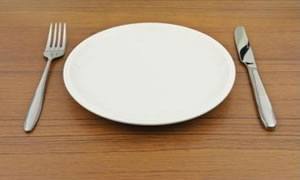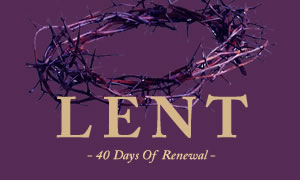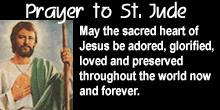


 It is a traditional doctrine of Christian spirituality that a constituent part of repentance, of turning away from sin and back to God, includes some form of penance, without which the Christian is unlikely to remain on the narrow path and be saved (Jer. 18:11, 25:5; Ez. 18:30, 33:11-15; Joel 2:12; Mt. 3:2; Mt. 4:17; Acts 2:38). Christ Himself said that His disciples would fast once He had departed (Lk. 5:35). The general law of penance, therefore, is part of the law of God for man.
It is a traditional doctrine of Christian spirituality that a constituent part of repentance, of turning away from sin and back to God, includes some form of penance, without which the Christian is unlikely to remain on the narrow path and be saved (Jer. 18:11, 25:5; Ez. 18:30, 33:11-15; Joel 2:12; Mt. 3:2; Mt. 4:17; Acts 2:38). Christ Himself said that His disciples would fast once He had departed (Lk. 5:35). The general law of penance, therefore, is part of the law of God for man.
The Church for her part has specified certain forms of penance, both to ensure that the Catholic will do something, as required by divine law, while making it easy for Catholics to fulfill the obligation. Thus, the 1983 Code of Canon Law specifies the obligations of Latin Rite Catholics [Eastern Rite Catholics have their own penitential practices as specified by the Code of Canons for the Eastern Churches].
Canon 1250: All Fridays through the year and the time of Lent are penitential days and times throughout the entire Church.
Canon 1251: Abstinence from eating meat or another food according to the prescriptions of the conference of bishops is to be observed on Fridays throughout the year unless they are solemnities; abstinence and fast are to be observed on Ash Wednesday and on the Friday of the Passion and Death of Our Lord Jesus Christ.
Canon 1252: All persons who have completed their fourteenth year are bound by the law of abstinence; all adults are bound by the law of fast up to the beginning of their sixtieth year. Nevertheless, pastors and parents are to see to it that minors who are not bound by the law of fast and abstinence are educated in an authentic sense of penance.
Canon 1253: It is for the conference of bishops to determine more precisely the observance of fast and abstinence and to substitute in whole or in part for fast and abstinence other forms of penance, especially works of charity and exercises of piety.
The Church, therefore, has two forms of official penitential practices - three if the Eucharistic fast of one hour before Communion is included.
Abstinence
The law of abstinence requires a Catholic 14 years of age until death to abstain from eating meat on Fridays in honor of the Passion of Jesus on Good Friday. Meat is considered to be the flesh and organs of mammals and fowl. Also forbidden are soups or gravies made from them. Salt and freshwater species of fish, amphibians, reptiles and shellfish are permitted, as are animal derived products such as margarine and gelatin which do not have any meat taste.
On the Fridays outside of Lent the U.S. bishops conference obtained the permission of the Holy See for Catholics in the US to substitute a penitential, or even a charitable, practice of their own choosing. They must do some penitential/charitable practice on these Fridays. For most people the easiest practice to consistently fulfill will be the traditional one, to abstain from meat on all Fridays of the year. During Lent abstinence from meat on Fridays is obligatory in the United States as elsewhere.
Fasting
The law of fasting requires a Catholic from the 18th Birthday (Canon 97) to the 59th Birthday (i.e. the beginning of the 60th year, a year which will be completed on the 60th birthday) to reduce the amount of food eaten from normal. The Church defines this as one meal a day, and two smaller meals which if added together would not exceed the main meal in quantity. Such fasting is obligatory on Ash Wednesday and Good Friday. The fast is broken by eating between meals and by drinks which could be considered food (milk shakes, but not milk). Alcoholic beverages do not break the fast; however, they seem to be contrary to the spirit of doing penance.
Those who are excused from fast or abstinence Besides those outside the age limits, those of unsound mind, the sick, the frail, pregnant or nursing women according to need for meat or nourishment, manual laborers according to need, guests at a meal who cannot excuse themselves without giving great offense or causing enmity and other situations of moral or physical impossibility to observe the penitential discipline.
Aside from these minimum penitential requirements Catholics are encouraged to impose some personal penance on themselves at other times. It could be modeled after abstinence and fasting. A person could, for example, multiply the number of days they abstain. Some people give up meat entirely for religious motives (as opposed to those who give it up for health or other motives). Some religious orders, as a penance, never eat meat. Similarly, one could multiply the number of days that one fasted. The early Church had a practice of a Wednesday and Saturday fast. This fast could be the same as the Church's law (one main meal and two smaller ones) or stricter, even bread and water. Such freely chosen fasting could also consist in giving up something one enjoys - candy, soft drinks, smoking, that cocktail before supper, and so on. This is left to the individual.
One final consideration. Before all else we are obliged to perform the duties of our state in life. Any deprivation that would seriously hinder us in carrying out our work, as students, employees or parents would be contrary to the will of God.


I have been thinking a great deal about my experience at Reconciliation this past Saturday. I felt an intense and unexplainable urge to go and confess my sins when I woke up that morning. I try to go every six weeks or so, but this was no routine visit to the priest for me. I needed to unburden myself of the numerous venial sins I had committed since I last participated in this Sacrament.
Purest Gold: God's Refining Fire in our Lives »
After salvation, many young Christians wonder if there's anything more to their newfound faith than just the security blanket of "being a Christian." Time and time again, God shows himself as a "refiner," and our lives are as gold. God started leading me in this study to understand what He was doing in my life, as well as in the lives of others.
Picking up my pen to write this column, I couldn’t imagine how time flies. Since the last publication of this column I have gone through a lot, especially the loss of my dear mother to whom I dedicate this article. Not only her, but seems I lost a whole generation of my close family.
How to Achieve Business Excellence »
“Do you see a man who excels in his work? He will stand before Kings; He will not stand before unknown men.” Proverbs 22:29
Spiritual Development for our Youth »
Most of us youth in today's fast moving world are easily thrown off by difficulties and worries.
The theme of conversion is a thread that runs all through Lent, but conversion takes on different aspects throughout the phases of Lent. The first two and a half weeks focused on the interior turning of hearts; the liturgy urges the faithful to reflect and examine consciences thoroughly.
Saint Josephine Bakhita »
Feast Day: February 8
Patron Saint Of: Sudan
Saint Josephine Margaret Bakhita was born around 1869 in the village of Olgossa in the Darfur region of Sudan. She was a member of the Daju people and her uncle was a tribal chief. Due to her family lineage, she grew up happy and relatively prosperous, saying that as a child, she did not know suffering.
Catholics Must Fast More Intensely This Lent»
The Norbertine Canons of St. Michael's Abbey have created this digital Lenten retreat so that you can journey through this holy season alongside them. If you want to have one of your best Lenten seasons yet, join us in our Lenten Program "The Great Fast" - https://theabbotscircle.com/the-great-fast-join
When Your Faith Is Put to the Test - Bishop Barron's Sunday Sermon»
Friends, we come now to the Second Sunday of Lent, and we’re on both dangerous and very holy ground with the first reading from the twenty-second chapter of Genesis. The ancient Israelites referred to it as the “Akedah,” which means the “binding”: Abraham binds and is ready to sacrifice Isaac at God’s command.

Copyright © 2002-2024 THE BEACON INTERNATIONAL CATHOLIC MAGAZINE. All rights reserved.
another mc.rufus interactive web design